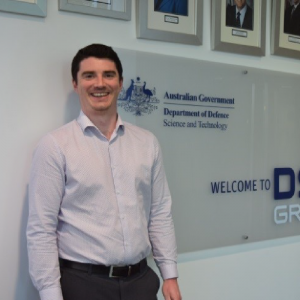Michael, 2019–20
Michael
What were you researching before you started as a Science Policy Fellow?
My research focused on the development of lithium ion batteries for use in the power-tool and electric vehicle markets. As a post-doc at a US National Laboratory I worked with industry partners on improving the safety performance, stability and scale-up production of emerging cathode materials. After my post-doc I worked for a clean energy technology start-up to commercialise silicon-based anode materials for similar applications.
What policy area are you working on through the Science Policy Fellowship Program?
I have been working to support the implementation of the Science and Technology Strategy for Defence 2020-30, a soon to be published policy document detailing how Defence invests in and engages with the wider national S&T enterprise. A significant portion of my work involves understanding how Defence and Defence Science and Technology Group moves research outcomes into in-service capability.
How has your research background helped you contribute to policy development?
I was fortunate enough to have worked closely with universities, industry and start-ups prior to starting the Fellowship. Understanding how each sector approaches their research and their strategies for acquiring funding has allowed me to provide a unique perspective to my immediate team. I’ve found that corporate knowledge of sectors outside of the APS is extremely valuable and appreciated within DST.
How has the program changed your career aspirations?
Throughout my research career I was always interested in the decision making processes and the strategies involved in supporting innovation and scientific research, I just wasn’t sure how to involve myself in that space. The Fellowship has provided a great opportunity to interact and work with Defence personnel who implement, support and monitor innovation and research within Defence, as well as foster collaborations with external partners. This has given me a more tangible understanding of what roles exist and how the skills I have (and the ones I’m learning) can contribute to them.
What is your favourite part about working in a policy role in the Australian Public Service?
I enjoy communicating how the strategic vision of the DST leadership will guide the wider DST workforce. It has allowed me to understand and include the advice provided by members of varied groups and divisions within Defence.

